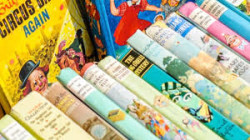
How to choose books for your kids
Lesson 1
What are the good fit
Not all books are created equal.
- Start Here
-
Read
There will always be books that can help you get through your most erratic creative thinking. You remember some books more than others. Books that have an impact on you that no other book has. I've had the pleasure of reading a huge number of them.
Have you ever wondered why you can't put some books down yet can't seem to grasp the substance of others? This is due to the fact that not all books are created equal.
There are three types of books: tolerable, terrible, and horrible. Furthermore, you will know when you have finished a good book because great books transform you. They transport you to places you had no idea existed. They allow you to see things in a new light. They demonstrate things to you. For children's literature, the situation is similar. When it comes to selecting the best books for children, not all books are created equal. So, what should you consider when selecting children's books?
Choose a good fit
The best book for your child is determined by their age and level of development. Great tiny children's books use vibrant colours and simple rhymes and themes to add to the intrigue of the storey. According to scientists, children who learned through rhymes excelled in later comprehension. A good young children's book employs repetition and conveys fundamental concepts such as colours, alphabet, and numbers. At this age, picture storybooks with a basic plot are okay.
Lift-the-fold books are very beneficial for young children since they encourage them to control and investigate the books. Support books are also fantastic for newborns since they promote active learning by allowing children to participate in activities like as applauding, spreading their eyes, and so on. There is evidence to support the idea that children who engage in successful reading reap the greatest benefits from this movement.
As children get older, simple books with activities might be appealing to them and should demonstrate a basic exercise. The lift-the-fold book Beautiful Oops!, for example, is a terrific intuitive book that can educate your kids that mistakes are an opportunity to be creative.
Children between the ages of three and six have a lot of questions about the world. Great books for this age group have simple plots and excellent realistic outlines that answer these questions. Basic instructional texts (true to life) about topics that interest children are also beneficial at this age. Great instructive books, such as Dinosaur Bones, are simple and deal with topics that children are interested in or are familiar with.
Children who are just learning to read require books with engaging and unusual plot lines. They use shifted books to investigate diverse skylines. As youngsters become older, the novels should logically get more mind-boggling, with more expressions and increasingly complicated narratives that require more reflection. At this age, the best novels feature characters that children can relate to. Enlightening books that provide a storey about fascinating facts are also enjoyable to read.
For every page, there are approximately five difficult words
Books that are beyond your children's reading ability will definitely disappoint them. Consider what they know while choosing a book. They should be able to read it quickly and understand the plot without having to look up each word. Examine a few pages for yourself and note any words that you think they could have trouble with. They will most likely dislike the book if there are too many difficult words each page (more than five). They should be able to read increasingly difficult texts as their knowledge grows.
You may buy your favourite children's books online from major publishers from the comfort of your own home; the main benefit of doing so is the cost savings. Many deal sites, such as CouponsABC & Askmeoffers, feature offers from a variety of retailers on their platform for children's books and stationery; you must look for the finest discounts to save the most money.
Choose a book that they won't want to put down
Allow yourself to be directed by the advantages of your children. If the book they're reading is connected to something that interests them, they'll probably enjoy it more. If you're still undecided about which books to buy for your children, read a few pages to see if you like the book. Remember, though, that you're buying the book for them; otherwise, they might hate it.
Inquire about services and read customer reviews
Depending on your children's age, bookkeepers and book stores frequently have a lot of useful advice to provide. Request that the neighbourhood curator recommend a pair of books that are appropriate for their ages and interests. You can also look at what people are saying on the internet.
Decide on wise choices
Books are an excellent resource for showing children the realities of life. Your children's books can teach them important life lessons. Consider the attributes you want your children to develop, and then make the appropriate book selections.
- Log in to mark this lesson complete.